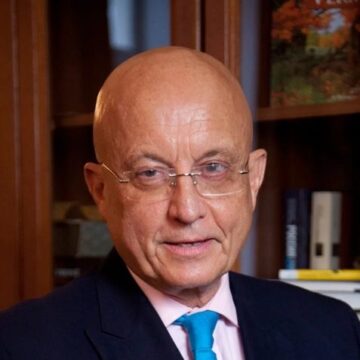The victory of Donald Trump reinforced international tendencies, which had been obvious for Russians and which had been guiding Russian behavior for last few years. Among them – deglobalization led by forces, which previously created it, but started to retreat from it, when they saw that it benefits others equally or more. The change in correlation of forces against the old world and towards Asia will continue, though at somewhat slower pace than in previous decades. China will continue to become in the very foreseeable future an equal to the U.S. in cumulative power. Europe of the EU will continue to muddle down. (Hopefully, not towards a collapse, but something leaner, more stable and healthier like a Common market, Schengen minus, two Eurozones or a Eurozone minus). The rivalry between the U.S. and China will continue to exacerbate. The confrontation between Russia and the West will continue, but will gradually dampen.
The confrontation was caused by “revisionist” refusal of Moscow as well as other new actors to play by the rules, imposed by the West since its seeming victory in the 1990s. The confrontation was sharpened by the revanchist attempt by the West to retake the positions it has started to loose fast since second half of the 2000s.
The showdown between “revisionists” and “revanchists” complicated the already pretty disquieting if not outright dangerous picture. When put on the background of structurally destabilized larger Middle East and intellectual lostness of most of the world elites this picture looked not only profoundly unstable but almost prewar.
The possible arrival to the Oval office of H. Clinton, the embodiment of liberal interventionists and neoconservatives elites which had ubiquitously failed and were desperate to have a revanche, or to prove that they had been right, made the situation to look even more dangerous. That America should have been deterred very roughly. Even if Madame Clinton was a more or less known and looked as a predictable entity.
D. Trump is less predictable, of course. He said a lot of things that raised eyebrows even in political incorrect Russia. Though some elements of the policy of his administration probably could be foreseen.
There will be more protectionism and thus exacerbated tensions with China. The partial historic retreat from Europe, inevitable under any administration, will accelerate.
A trillion dollar worth program of revamping U.S. infrastructure will help to reinvigorate U.S. economy and “make America great again”. But not as a leader of a global liberal economic order.
Russia and the U.S. have now a better chance to avoid a collision course and while disagreeing on many issues stop the slide towards a new military-political confrontation in Europe. Possibly by freezing existing levels and even mutual withdrawal of forward positioned forces and by agreeing at last that all military planes should fly with transponders switched on. So far NATO has been refusing Russian offers for a common policy on that matter. Now that Russia in Syria has stopped the sequence of regime changes and newly elected American president paralleling condemned bombing of Belgrade, invasion of Iraq and Libya, two sides could cooperate not against each other as previous but with each other crushing. Daesh in Syria and Iraq and imposing a political solution. Now that Russia after not been listened to her protests for more than two decades has stopped the greedy and mindless expansion of Western alliances on the territories it considered vital to its security by showing its will and resolve, there is a possibility for a solution of the Ukrainian problem before the country melts down or collapses. Trump showed no interest in fueling Ukrainian conflict. Russia and the U.S. could even try together and bringing in other partners on a common effort of strengthening international strategic, stability including finding a constructive role for nuclear weapons in the new more turmolous world.
But, of course, nobody knows whether that could happen and what would happen and whether the new American president could make any, even constructive and wise steps with the majority of U.S. elite almost physically hating him and the country divided.
What could Europe do? Understand at last that it has to take care of itself, treat ills acquired due to overextension and mistakes. It should understand the obvious: the world unfortunately is not moving toward post-modernism and by clinging to liberal illusions European elites are condemning the Union and their nations to further mistakes and are driving themselves into self-pitying though glorious isolation. EU also could not solve its problems organizing itself against Russia. Because the cause is artificial and also because the gauntlet has been unwisely thrown at a far stronger partner, which has a lot more of strategic vision and perseverance and also, according to our European tradition, has a right to choose the weapon, when challenged to a duel.
In the meantime Russia in the mindset of its ruling elite and most of population is now clearly not a fringe European country anymore, but an Eurasian and a global power.
It is still deeply interested in continuation and development of its cultural and economic ties with Europe. That is why, while continuing its move to the East, Russia, this time with China and other Asian partners has officially started to promote the concept a partnership of Greater Eurasia – a common space of development, cooperation and security from Shanghai (or Singapore or Tokyo) to Lisbon. Of course not against America. At least not against America of Trump, if he is able or allowed to go along his and American better impulses and instincts.










